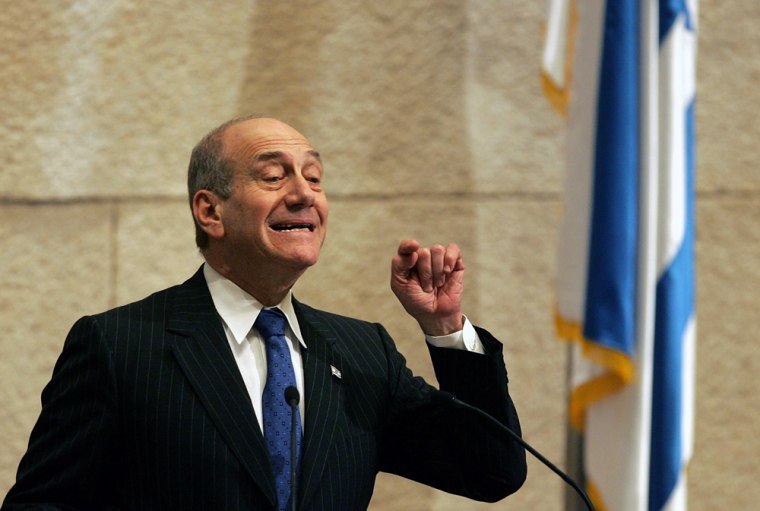Prime Minister Ehud Olmert laid out his agenda for the coming year in a policy speech to parliament Monday, but he made no mention of the key issue that brought him to power: a unilateral pullback from the West Bank.
The omission reflected Olmert’s weak political standing following the inconclusive war in Lebanon and signaled dimming hopes for a diplomatic breakthrough with the Palestinians.
Olmert also repeated a call to meet Palestinian President Mahmoud Abbas. But the speech, made at the opening of the parliament’s winter session, was overshadowed by the absence of President Moshe Katsav, who was forced to skip the proceedings a day after police recommended indicting him on rape charges.
Olmert was elected last March as leader of Kadima, a new political party promising a large withdrawal from the West Bank. The pullback, to be implemented without an agreement with the Palestinians, was to be based solely on Israeli security needs, similar to last year’s unilateral withdrawal from the Gaza Strip.
But Olmert was forced to put the plan on hold after militants in Gaza seized an Israeli soldier and Hezbollah guerrillas in Lebanon captured two soldiers in separate cross-border raids.
Both sets of abductions sparked large Israeli military offensives, and the heavy damage inflicted upon Israel by Hezbollah — along with the failure to free the soldiers — has weakened Olmert.
Instead, Olmert suggested the meeting with Abbas but gave few details on what he hopes to accomplish.
Olmert aides have conceded that he would have to put his West Bank pullout plan on hold, and Monday’s speech signaled that it is no longer on his agenda.
“Abu Mazen is a legitimate partner,” Olmert said, referring to the Palestinian leader by his nickname. “We have comprehensive contacts with him and with his people, and I am ready to meet him immediately, if he agrees, to discuss ways to make progress according to the road map.”
The road map, an internationally backed peace plan meant to establish a Palestinian state alongside Israel, has been stalled since its launch more than three years ago.
Road map leading nowhere
After the Hamas victory in Palestinian legislative elections early this year, chances for reviving the road map appear slim. Hamas has repeatedly rejected calls by the road map’s sponsors, including the U.S. and European Union, to renounce violence and recognize Israel’s right to exist.
Olmert said there would be no talks with Hamas until the group, which Israel, the U.S. and EU consider a terrorist organization, accept the international demands.
Saeb Erekat, a Palestinian negotiator who is close to Abbas, said “every effort” is being made to bring about the first summit between the Israeli and Palestinian leaders, but no date has been set.
“We hope that both sides can begin to implement the road map, reaching the two-state solution,” Erekat said.
The Palestinians want assurances that the meeting will be substantive. Olmert has insisted that the Israeli soldier being held by Gaza militants be released first.
During his speech, which was repeatedly interrupted by heckling lawmakers, Olmert insisted that the war in Lebanon — in which Hezbollah fired thousands of rockets into Israel and killed 159 Israelis — was a success.
PM widely criticized
Olmert and other leaders have been widely criticized for failing to destroy Hezbollah during the monthlong fighting or win the release of the two soldiers held by the guerrilla group. Many returning soldiers have said the army was poorly prepared and did not have proper food, water or ammunition.
Olmert noted the U.N.-brokered cease-fire, which has brought in an expanded U.N. force to police Hezbollah’s stronghold in southern Lebanon and keep the border quiet. “Hezbollah has ceased to exist as a state within a state in Lebanon,” he said.
Olmert also invited Lebanon’s prime minister, Fuad Saniora, to enter talks “without the use of go-betweens, in order to forge peace between us and Lebanon.”
In Beirut, Saniora’s office rejected the call, saying the Lebanese premier “had announced more than once that Lebanon would be the last Arab country to sign peace with Israel.”
Olmert also rejected calls by Syrian President Bashar Assad to renew peace negotiations. Olmert said Syria must first end its support for Hezbollah and Hamas, dismissing Assad’s offer as a “tactic to divert world opinion” from Syria’s harboring of extremist groups.
